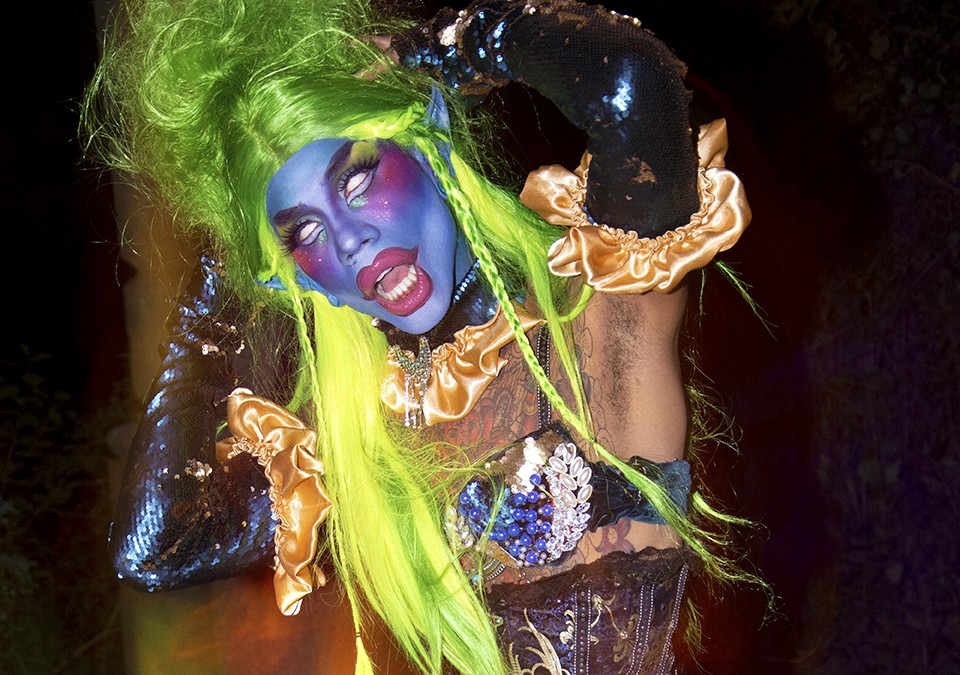This past March, Maxi Glamour eluded questions about their plans. The St. Louis-based entertainer, guru, event planner, designer and self-proclaimed "nonbinary queer demon" was set to be honored with a 2019 Influence Award at a splashy Out in STL awards party overlooking the Arch. The award was in recognition of Glamour's work and influence in the drag community, holding drag workshops and mentoring emerging performers.
But when asked if they planned to attend the gala, Glamour was noncommittal. "I'll likely be out of town that week," they posited.
"I told everyone I was going to Paris for an artist residency program," Glamour later reveals. "And I'm so bad at keeping secrets."
Secrecy, however, was contractually required. Glamour was actually flying to Los Angeles to film season three of the hit reality show Boulet Brothers' Dragula, vying to be "The World's Next Drag Supermonster."

The Making of Maxi
As a rule, Glamour doesn't reveal their age — not because they've got a complex about it, but because nurturing the mystery is an investment in their future intrigue. However, they drop a few clues. They explained their public life began as a fourteen-year-old club kid, once mentioned being "in the scene" for fifteen years and said they've got a milestone birthday next year which they plan to spend in Norway. Their Facebook page also reveals they graduated from Fort Zumwalt South High in 2008.
"I started off just going to parties and concerts wherever they were — basements, clubs, warehouses, trailers, et cetera — the more people the better," says Glamour. "But not just people — the weirdos, the freaks, the broken, those were the people to whom I was drawn. We would congregate at shows and even malls in our most outrageous costumes that we thought were so fly.
"You remember the scene-kid days when the goth aesthetic was vibrant and glamorous, when malls were still busy and the war between preps and punks raged on? These were the days when Mississippi Nights, Creepy Crawl and Cicero's were still around. It was a different era of St. Louis nightlife culture," Glamour says. "That was my youth." And during this time, their Myspace page was lit.
"Myspace was the newest, coolest thing in the music scene, and you had to make one. Being yourself was antiquated. You needed a new identity so people online thought you were cool. There were the Jeffree Stars, the Scotty Vanitys, the Lexi Lushes — it was all about being someone, someone unique, someone you created, someone cool enough to be in your friends' top eight."
Glamour went by several aliases during this time, including Rumplestiltskin, Alex Shaw and Xander Wright.
"So I created Maxi Glamour. It was my way to create a new identity to make coming out of the closet easier. It was my superstar identity to lose all inhibition and join the ranks of Sid Vicious, Boy George, Marilyn Manson, Walt Paper, James St. James and all of my other icons. I wanted to be a club kid. I knew that's what I wanted in life."
The 2003 movie Party Monster, based on the true story of club kid Michael Alig, who bragged on television about killing his drug dealer and roommate, further fueled Glamour's interest in club culture.
"After seeing Party Monster five-thousand-too-many times, I read up on club culture and knew I wanted to create events. Parties that were for freaks like me. For the people that couldn't fit in with the rest of the world or didn't want to. It was centered around sex, drugs and that rock & roll lifestyle. It was an escape from the reality of the time we lived. Queer folk had no rights — we couldn't get married, we were barely in the media in the early 2000s, and it was a depressing state," they explain. "Especially in the middle of the country where time moves slower. The underground club scene shouted loud messages that enticed my young heart. Messages like PLUR — Peace Love Unity Respect, from the rave scene — really resonated, as it created a sense of welcoming. In addition, the imagery of punk and electro musicians really helped make their concerts a way to feel comfortable as a masc-ish person to be hyper-flamboyant in makeup and in weird clothes.
"I can say that music hasn't had nearly the same impact on me as it did in these days. Maybe it was the drugs. But all I knew is that I wanted to help create a space for weirdos to be and exist to show off cool costumes and rejoice in each other's presence while enjoying some art form. At that time it was all about the music, knowing the coolest bands, the most underground things going and being original."
MTV's Sweet Sixteen also inspired Glamour's desire to party like a rock star.
"I saw all these spoiled girls getting their own parties and booking B2K, Nelly and other celebrities for their sixteenth birthday party, so I decided I wanted to book something cool for my sixteenth. I reached out to local band Center Pointe and had them play at my mom's boyfriend's house. It came complete with hot-tub swimming pool, and on this night a band to play songs for me. The next party I threw was when I was seventeen and booked Super Fun Yeah Yeah Rocketship at a mini rave in my basement. I say it was a rave, but it was just twenty people on ecstasy waving glow sticks in the dark. That party lasted a few days and changed locations multiple times. We'd go on these party binges where we'd just party every day for days on end, drinking, smoking, fucking. It was a mess, but it was romantic."
At nineteen, Glamour left for San Francisco to study fashion at Academy of Art University — but says their dad stole their student loan money, which resulted in being homeless by the second semester.
"I didn't have a home to do homework and had to party crash," they explain, "where you'd just crash at the places where you partied."
After a year, Glamour returned to St. Louis. I asked if there was ever any resolution with their father.
"I don't really chat with him. He's not really a part of my life."
By 2012, Glamour, who's fascinated by world cultures, adopted the moniker "Demon Queen of Polka and Baklava" — two things that transcend cultural boundaries — and graduated from house parties with the production of their first event, Glamourfest, which was held at Tower Grove South's venerable drag bar, Grey Fox Pub. "It was my birthday and I had a slew of shirtless twinks hand-crush almonds for baklava for this epic event. It was very crowded, even though six people in the cast of fifteen didn't actually come. There was drag, burlesque, music, belly dancing and of course baklava."







